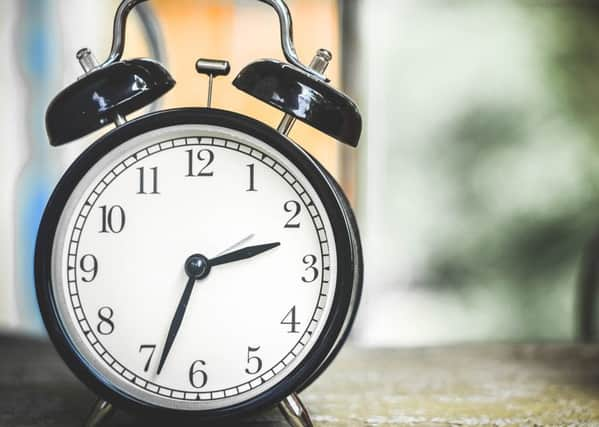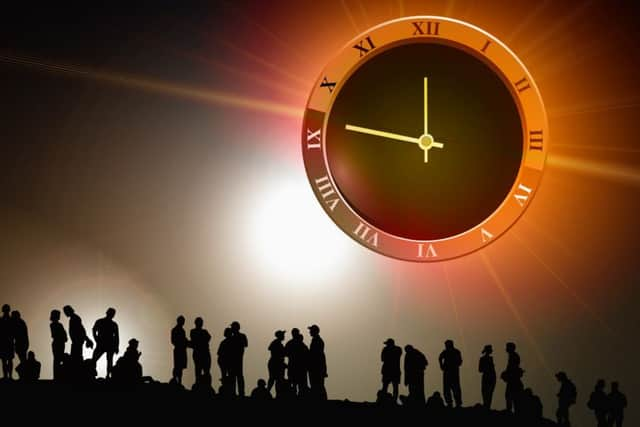Time to turn the clocks back as Fifers prepare for winter


The date might change, but every year, on the last Sunday in October, Fifers wynd their clocks back one hour at 2am, reverting to Greenwich Mean Time (GMT). This marks the official end of British Summertime.
We always put our clocks back for winter and forward in the spring, hence the well-known phrase “Spring Forward, Fall Back”.
Advertisement
Hide AdAdvertisement
Hide AdThis year the autumn time change will take place on Sunday, October 30 so we will all get an extra hour at the end of this month.


But the question is: who came up with the idea for British Summer Time?
The answer is a man called William Willett. He introduced the notion of British Summer Time, also known as Daylight Saving Time, in 1907.
He wanted to prevent people from wasting valuable hours of light during summer mornings and published a pamphlet called ‘The Waste of Daylight’ to try and get people out of bed earlier by changing the nation’s clocks.
Advertisement
Hide AdAdvertisement
Hide AdWillett proposed that the clocks should be advanced by 80 minutes in four steps during April and reversed the same way during September.


He then spent the rest of his life trying to convince people his scheme was a good one.
However, he never got to see his idea come to fruition because he died of flu in 1915 at the age of 58 – a year before Germany adopted his clock-changing plan when the clocks were put forward at 11pm.
Germany was the first country to introduce the scheme on April 30, 1916 during the First World War in order to save fuel and allow people to spend more time working in the fields.
Britain followed a month later on May 21.
Advertisement
Hide AdAdvertisement
Hide AdThe Summer Time Act of 1916 was quickly passed by Parliament and the first day of British Summer Time, May 21. 1916, was widely reported in the press.
However, there have been instances in the past when people’s clocks were not altered – for example in 1940 during the Second World War, clocks in Britain were not wound back by an hour at the end of Summer Time.
In the years after, clocks went back to being advanced by one hour each spring and reversed by an hour each autumn until July 1945 – during these summers, Britain was two hours ahead of GMT and operating on British Double Summer Time (BDST).
But the clocks were brought back in line with GMT at the end of summer in 1945. And in 1947, due to severe fuel shortages, clocks were advanced by one hour on two occasions during the spring, and put back by one hour on two occasions during the autumn, meaning that Britain was back on BDST.
Advertisement
Hide AdAdvertisement
Hide AdThere have been various trials over the decades from double summer time (GMT + two hours) during the Second World War to permanent British Summer Time (GMT + one hour) during the late 1960s, but the current system of changing the clocks at the end of March and October has been in place since 1972.
Meanwhile, Police Scotland has issued road and home safety advice to Fifers ahead of the clocks turning back this month.
Inspector Brenda Sinclair from Fife’s Road Policing Unit, said: “I would advise drivers to ensure their vehicles are roadworthy and are driven at appropriate speeds to reflect the unpredictable road conditions they may face this winter. Between October 17 and 23, Police Scotland will run its Ready for Winter campaign and car clinics will be held across Fife where police will check cars for readiness for winter. Officers regularly monitor Fife’s arterial routes to identify vehicles not suitably equipped for winter travel.”
Fifers are also urged to remain vigilant against opportunistic thieves as the darker nights approach.
Advertisement
Hide AdAdvertisement
Hide AdChief Inspector Elaine Logue said: “With the darker nights we are encouraging householders to discourage criminals by ensuring their cars and homes are locked and secured. Plan ahead and remember that it may be dark when you leave and return from work. Simple measures such as having lights on timer switches can make your home look occupied and deter would be thieves. Always keep your valuables out of sight.”
Abolish Daylight Saving Time
Why do we turn the clocks back?
The debate goes back years in history. During the First World War, supporters of Daylight Saving Time argued that such a proposal could cut domestic coal consumption and increase the supplies available for manufacturing in the war effort. Today those in favour say it reduces traffic accidents, saves energy, boosts tourism and encourages more people to exercise outdoors, although critics claim the darker mornings are dangerous for children walking to school. In 2011, Tory MP Rebecca Harris floated a bill calling for year-round daylight savings but it failed to make it through Parliament.